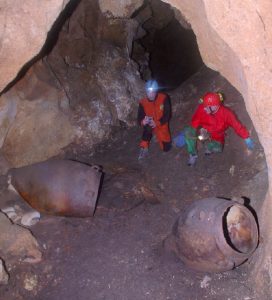Archaeologists have tested a large storage jar dating back to Copper Age (early 4th millennium BC), found at Monte Kronio site, Agrigento, Italy. Chemical analysis of its residue has tested positive for organic traces characteristic for grapes and winemaking process.

Chemical analysis of residue on unglazed pottery discovered at the site off the Southwest coast of Sicily identified tartaric acid and its sodium salt, which occur naturally in grapes and in the winemaking process. Archaeologists are also trying to determine whether the wine was red or white. So far it was believed that wine production developed in Italy in the Middle Bronze Age, around 1300-1100 BC, based on the finds of grape seeds and economies of the Bronze Age societies. Identification of such residue is very rare as it requires the pottery to be excavated intact.
(after Davide Tanasi, University of South Florida & PhysOrg)